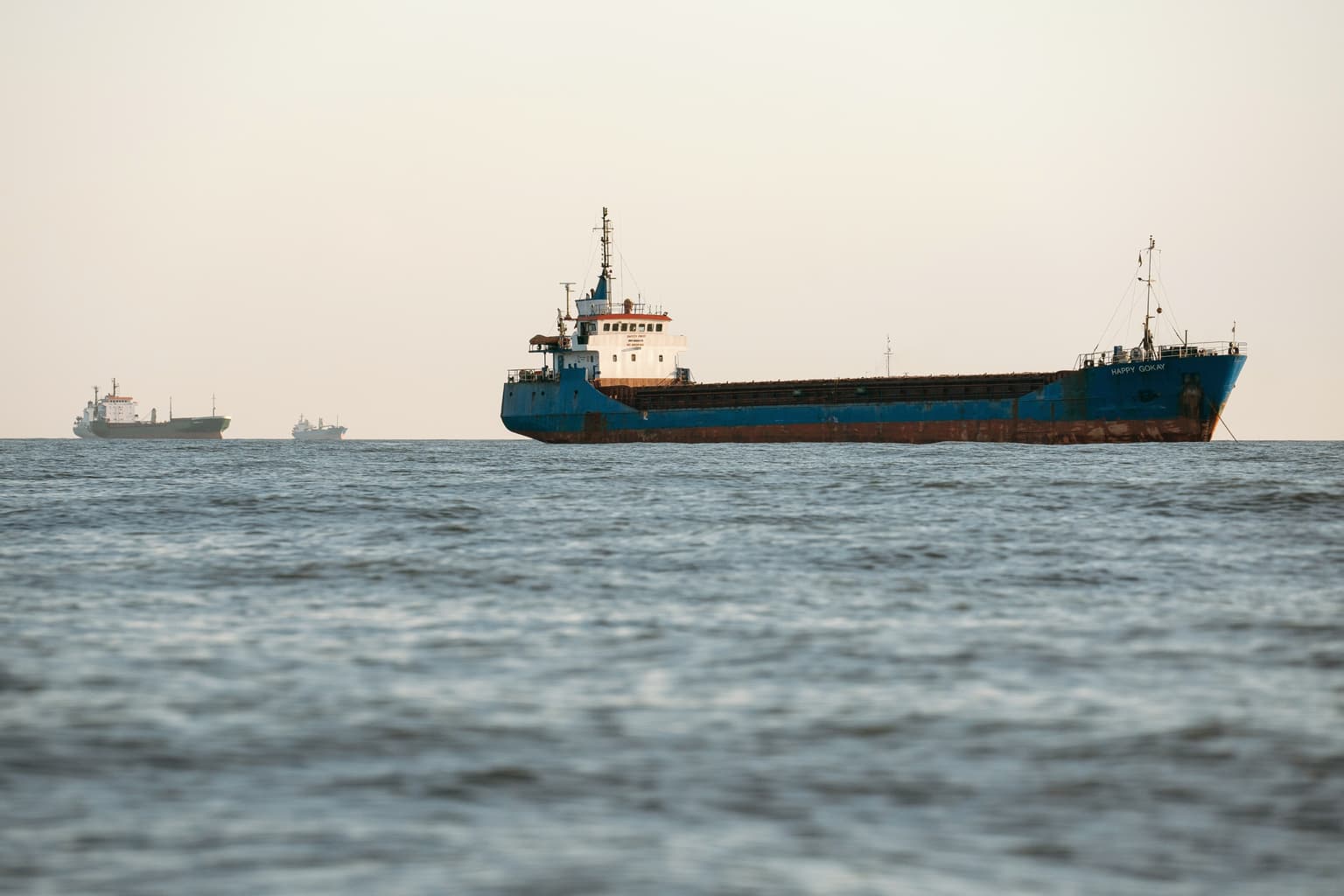Ukrainian grain has nowhere to go as Russian blockade persists

Ukrainian farmers begin the July harvest knowing there may be nowhere to store their grain or export it, as Russia’s naval blockade of Ukrainian Black Sea ports enters its fifth month.
According to Ukraine's estimates, 22 million tons of grain already stockpiled across the country remain in their silos. By fall, that number may reach 60 million.
While the Kremlin has failed to reduce Ukraine to a landlocked country, Russia has captured naval superiority in the northern Black Sea, obstructing ports through which 95% of Ukraine’s exports once flowed, according to the Ukrainian Sea Ports Authority.
This means Ukraine is currently only able to export 1.5 million to 2 million tons of grain a month – one-fifth of its pre-war figures – via 11 railway crossings to the EU and three ports on the Danube River.
Negotiations on unblocking the ports have all but stalled as world leaders make feverish attempts to prevent a new wave of famine threatening dozens of vulnerable countries. And as Russia continues to deny responsibility, demanding sanctions relief while targeting grain silos and looting Ukrainian grain, any hopes of ending the blockade are quickly evaporating.
According to Agricultural Minister Mykola Solskyi, the way to successfully deblock Ukraine’s Black Sea ports is by defeating Russia militarily.
“This is why we are asking and requesting our partners to give us weapons to do this, to defeat Russia – it’s the only way to solve the problem,” Solskyi told the Kyiv Independent.
Grain at risk
Ukraine’s upcoming harvest is expected to reap an additional 35 million tons of grain, says Nikolay Gorbachov, head of the Ukrainian Grain Association. Already unable to move last year’s yield, there may be nowhere to store this season’s harvest.
Prior to Russia’s full-scale war, Ukraine’s grain terminals at the seaports of Mykolaiv, Odesa, and Kherson, easily loaded vessels with 12,000-13,000 tons of grain per day. Some ships could even carry up to 40,000 tons per day.
By contrast, the three ports still operating in Ukraine – Izmail, Reni, and Kiliya – are only able to load up to 1,000 tons of grain per day. All three ports are in Odesa Oblast.
Railway transportation has grown in response. By the end of May, grain exporters managed to transport seven times more grain monthly compared to their pre-war capacity of 200,000 tons per month via railway going to western Ukrainian borders, according to Gorbachov.
But this solution has reached its limit, experts say. Ukraine’s railway infrastructure, unlike its seaports, is not equipped to handle all of the grain the country produces for international markets.
As a result, nearly 100 cargo ships loaded with Ukrainian grain lined up to enter Romania’s Sulina Canal a few kilometers from its border with Ukraine due to the waterway’s inability to accommodate additional vessels.
Even as new projects are undertaken to expand Ukraine’s export capacities via its western borders, Gorbachov says “European infrastructure is not able to process the volume of grain that Ukraine can offer.”

And then there is the grain harvested in Russian-occupied territories, in which Solskyi says farmers are working at a risk to their own lives.
“They harvest grain knowing it could be stolen,” the agricultural minister told the Kyiv Independent.
Ukraine has also called on world leaders to reject grain shipments from Russian-flagged cargo ships it says are carrying stolen Ukrainian grain.
On July 2, Ukraine asked the Turkish government to take “urgent” measures to detain the Russian-flagged Zhibek Zholy cargo ship that was carrying 7,000 tons of stolen grain from the Russian-occupied port of Berdiansk.
But on July 4, a Ukrainian investigative journalism team Schemes reported that satellite images showed that ships loaded with grain have been leaving Ukrainian ports in the occupied territories and unloading in Turkey.
Meanwhile, Russia has targeted Ukraine’s grain storage facilities. As of April, Russia had destroyed six grain storage facilities in Ukraine. And on June 4, a Russian missile strike hit and destroyed Ukraine’s second-largest grain storage facility in Mykolaiv.

At an impasse
As the blockade bottlenecks the world’s supply of food, world leaders have attempted to initiate diplomatic efforts to loosen Russia’s hold on Ukrainian grain.
The EU and the UN are attempting to negotiate the creation of Black Sea grain corridors from Ukraine’s ports.
EU’s Foreign Affairs Chief Josep Borrell told Deutsche Welle on June 21 that he is confident that the UN can reach an agreement with Russia, adding that resisting the pressure from the international community is “unthinkable.”
But the U.S. is skeptical that UN-Russia talks will free Ukrainian grain. Describing Moscow’s request for the lifting of sanctions in exchange for easing the blockade as “extortion diplomacy,” a U.S. official said the White House will not agree to a deal that lifts economic pressure from the Kremlin, according to Politico.
Turkey, which has authority over maritime traffic through the Bosphorus strait when entering the Black Sea, is also attempting to broker talks between the United Nations, Ukraine, and Russia to discuss a Black Sea grain corridor. According to Turkish newspaper Milliyet, the talks are set to take place in Istanbul in the coming weeks.
On July 4, President Volodymyr Zelensky confirmed that Ukraine is currently in negotiations with Turkey and the UN.
Turkey offered to create a command center with an office in Istanbul, as well as routes for the export of Ukrainian grain, ensuring the safety of ships and demining ports.
However, Gorbachov from the Ukrainian Grain Association, whose members are responsible for 90% of the country's grain exports, doubts Turkey’s proposal.
He called it "non-working," since the purchased grain belongs to exporters and these are mainly international companies, carefully looking at geopolitics. For such companies, Turkish-UN-Russia guarantees cost little.
“For these companies, real guarantees are American, British, French, but not Turkish,” said Gorbachov. “It can be done technically if, for instance, a British or American aircraft carrier enters (the Black Sea)” to provide protection for vessels carrying grain.
But Russia’s guarantee is worth nothing according to Gorbachov. “We cannot trust their words. They are liars,” he said.
No end in sight
As Western leaders scramble to find a solution and President Volodymyr Zelensky calls for additional weapons to protect Ukraine’s vessels and key maritime routes, unblocking the Black Sea route without military intervention remains difficult.
Russia, along with others in the West, has also called for Ukraine to demine its waters to allow for the safe passage of grain. Ukrainian officials reject these proposals, saying that demining the seas around Ukraine's ports would leave them vulnerable to amphibious Russian attacks.
Moscow, meanwhile, is seeking to pressure European nations to ease sanctions and to push for a ceasefire on Russian terms as it uses the imminent threat of global hunger as leverage, Sidharth Kaushal, a naval expert with the Royal United Services Institute think tank, told the Kyiv Independent.
Similar to how the Syrian civil war was preceded by a sharp rise in food prices, Russia is aware that it can employ “second-order effects such as state instability” to effectively pressure European nations, says Kaushal.
The Kremlin intends to “undermine Western cohesion and leverage global opinions,” Kaushal said.
He also said that Russia is also likely trying to curry favor with lower income countries through the delivery of grain, while pinning the blame on the West and Ukraine for the lack of food supplies and rising prices.
“If Russia was thinking about how to feed these people, they wouldn’t target Ukraine’s infrastructure, including silos with grain that is ready to be exported,” said Oleksandr Khara, foreign affairs and security policy expert at the Center for Defense Strategies.

Andrii Klymenko, head of the Institute for Black Sea Strategic Studies’ Monitoring Group, said he doesn’t expect negotiations to yield positive results, even if the U.S. or Germany get involved.
Klymenko said that Western countries will not commit to a military escort for the transportation of Ukrainian grain as Russian forces will target a ship under any flag, potentially leading to a war with NATO.
“The blockade will continue until the war is over,” Klymenko told the Kyiv Independent.











